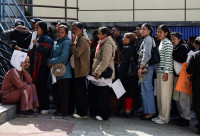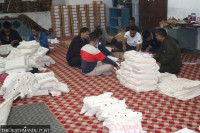National
Repatriation of bodies of Nepali migrant workers who died abroad also affected due to Covid-19
Amid international travel restrictions and lockdowns, officials tell Nepali missions abroad to hold applications until further notice.%20(3).jpg&w=900&height=601)
Chandan Kumar Mandal
While the Covid-19 outbreak has left many Nepali migrant workers stranded in foreign land, even the mortal remains of those who have died in foreign land can’t be brought home now.
For nearly a week now, repatriation of bodies of Nepalis who died abroad has been completely halted as the government banned international flights to stop the spread of the contagious coronavirus, which has killed thousands of people worldwide.
On an average, two Nepali workers die every day while working abroad.
“The process to bring back bodies of Nepali migrant workers has also been affected due to the Covid-19 pandemic,” said Rajan Prasad Shrestha, executive director at the Foreign Employment Board, a government agency that works for the welfare of migrant workers.
“International flights are not coming in from anywhere, including our labour destination countries,” he said. “That means the bodies are also stranded.”
Every year hundreds of Nepali workers die abroad and the arrival of their bodies in coffins is a common, but tragic, sight at the Tribhuvan International Airport.
The last body was repatriated on Monday, a day before the lockdown started, when an Etihad Airways flight brought home the body of Bibek Thapa, who died in the United Arab Emirates on February 22. The body was taken to Pashupati for its final rites in a van provided by the board.
Besides providing financial assistance to migrant workers who suffer injuries and the families of people who die working abroad, the board also provides free vehicles to ferry the dead to their homes across the country. Even if the bodies do arrive from abroad, it is difficult for families to come to the airport due to domestic travel restrictions.
“Under the prevailing circumstances, it’s difficult to bring bodies to Nepal and then transport them to their family members,” said Shrestha. “Even family members might face hurdles travelling to Kathmandu to receive the bodies,” added Shrestha. “We have requested Nepali missions abroad not to issue no objection certificates for a few days to send bodies to Nepal.”
Due to ongoing travel restrictions, the board, which is on other days flooded with applications, has received two applications in the last few days. It has received requests to repatriate the body of a man from Rolpa who died in Qatar and another one from Gorkha who had died in the UAE.
“Although we are on standby with our vehicles, families [of the deceased] are not approaching us,” said Shrestha. “They also know that the country is under lockdown and almost everything is closed for now. Receiving dead bodies is not easy for them too.”




 20.9°C Kathmandu
20.9°C Kathmandu














